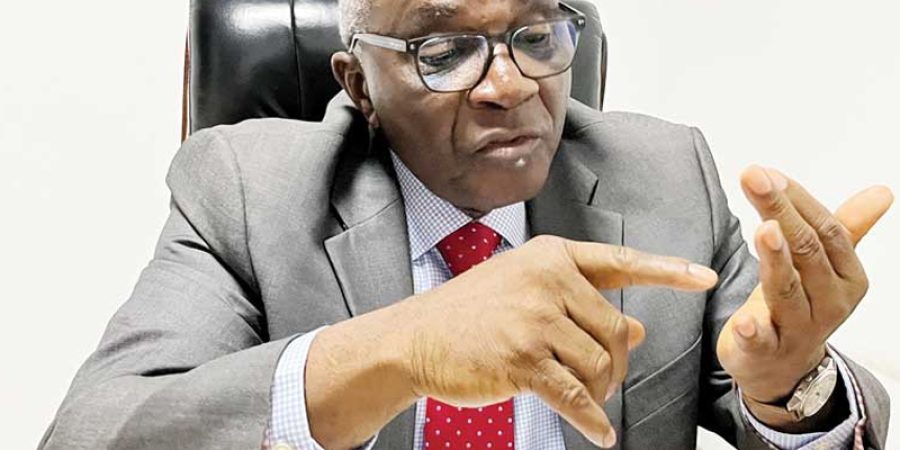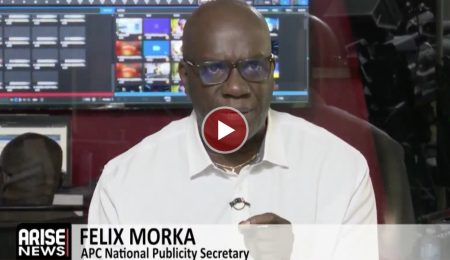The Presidency on Wednesday declared that the nation was witnessing a historic shift in its public finances, with non-oil revenues driving the country’s strongest fiscal performance in decades.
Presidential spokesperson, Bayo Onanuga, who revealed the statistics, stated that between January and August 2025, total government collections peaked at N20.59 trillion, a 40.5 per cent increase compared with the N14.6 trillion recorded in the same period in 2024.
The figures were released the same day President Bola Tinubu declared that his government’s bold economic reforms, which aim to restore Nigeria to its enviable position, were already yielding fruitful results.
According to the data from Onanuga, N15.69 trillion came from non-oil sources, accounting for three out of every four naira collected while describing the figures as a decisive break from decades of dependence on crude oil exports.
“This is a watershed moment for our economy. For the first time in decades, oil is no longer the dominant driver of government revenue. Reforms, compliance, and digitisation are powering a more resilient economy,” Onanuga stressed.
Tinubu had underscored the performance on Tuesday while receiving a delegation of the Buhari Organisation led by Senator Tanko Al-Makura at the State House, Abuja, saying the numbers are proof that government reforms to expand the revenue base and strengthen compliance are working.
He said: “We have laid the foundations for a fairer, stronger fiscal system that will deliver for all Nigerians.
“Our revenues are growing because we are making every naira count, and because Nigerians are responding to reforms that are in the interest of the country.”
Tinubu has consistently argued that stronger fiscal foundations are critical to achieving his administration’s Renewed Hope Agenda.
The President’s remarks came against the backdrop of criticism from some quarters about the state of the economy, particularly inflationary pressures and hardship linked to subsidy removal and exchange rate unification.
His reference to revenue growth during the meeting with the Buhari Organisation was partly aimed at countering those narratives.
The Presidency further explained that the boost in revenue is already being felt across the federation through unprecedented disbursements from the Federation Account Allocation Committee (FAAC).
In July, monthly allocations to states and local governments crossed N2 trillion for the first time in history, giving subnational governments more resources to invest in food security, infrastructure, and social services.
It also revealed that, for the first time in years, the federal government has not borrowed from local banks in 2025, signalling an end to the pattern of deficit financing that weighed heavily on the financial system.
The Presidency attributed the surge in non-oil inflows to a combination of reforms. Customs automation, digitised tax filings, tighter enforcement, and broadened compliance are credited with raising efficiency and plugging leakages.
According to released figures, the Nigeria Customs Service collected N3.68 trillion in the first half of the year, surpassing its target by N390 billion and already meeting 56 per cent of its full-year goal.
The Presidency insisted that the overperformance was not a one-off windfall, but the result of systemic changes.
Similarly, the Federal Inland Revenue Service has expanded digitised tax administration, bringing more businesses and individuals into the net. While inflation and exchange rate revaluation contributed to the uplift, government officials emphasise that the bulk of the gains stem from policy and institutional reforms.
Despite the rosy picture, the Presidency cautioned that the revenue performance still falls short of the scale of investment Tinubu envisaged in education, healthcare, and infrastructure.
“Revenues are rising, the base is broadening, and reforms are working. But the task ahead is to turn these numbers into real relief for Nigerians, in better schools, hospitals, roads, jobs, and food security. What matters now is ensuring the benefits are felt across the country,” the statement added.
Meanwhile, Tinubu on Wednesday declared that his government’s bold economic reforms, which aim to restore Nigeria to its enviable position, are already yielding fruitful results.
According to Tinubu, the country’s economy is now stable and attracting interest from around the world.
The President made this disclosure at the State House, when he received the Soun of Ogbomosoland, His Imperial Majesty, Oba Ghandi Afolabi Oladunni Olaoye, Orumogege III, in audience with some other royal fathers.
Tinubu said, “Years of neglect and self-deception, fake records, smuggling, and all of that denied Nigeria the necessary revenue for progress and development.
“Then we were confronted again with arbitrage trading of currency, an illusion of selling papers, corruption all over the place, and the integrity of the country and its economy being extremely and adversely challenged.
“We had to take those actions. With your prayers, patience, perseverance and great understanding, I’m glad to tell you today that the economy is stabilised. The bleeding has stopped. Haemorrhage is gone; the patient is alive.”
The President also said the establishment of NELFUND was to ensure that no student would drop out because of poverty.
He affirmed that everybody has a right to education, saying it was the, “greatest weapon you can give to human beings against poverty; that’s what we are doing. We have remained aggressive on our infrastructure. And it’s just two years.”
Tinubu thanked the Soun of Ogbomoso for crediting his administration with the bold decisions taken immediately upon resumption of office.
He noted that the people of Ogbomosoland were already feeling the modernisation and transformation introduced by the monarch, who promised to strengthen traditional institutions.
The President promised to engage the Ministers of Power, Water Resources, Agriculture, and Works to look into the visiting monarch’s requests, stating that they could make Nigeria self-sufficient in agriculture.
Earlier, the Soun commended the President for his strides, which “only a bold leader could have recorded. Removing fuel subsidy has shown us that it is the right decision, and we can see the effects.”
Oba Olaoye said the foreign exchange reforms and introduction of NELFUND have made it easier for many students to continue their schooling without considering dropping out.
The royal father also commended the President for awarding the contract for the dualisation of the Oyo-Ogbomosho Road, which had been abandoned for decades, pointing out that the road would spur economic activities as a significant gateway to the North.
The paramount ruler, however, requested the President’s intervention in the water and power supply in Ogbomoso, the upgrading of the General Hospital in the town into a Federal Medical Centre, as well as the establishment of a research institute to enhance the development and transformation of the famous ‘Ogbomoso mangoes and cashew nuts’ into a viable agricultural enterprise.
Oba Olaoye thanked the President for appointing Ogbomoso sons to his administration, notably the Federal Inland Revenue Service Chairman, Zacch Adedeji, and the DG of the Bureau of Public Procurement, Debo Adedokun.
On the entourage of the Soun of Ogbomosoland were five other Kings representing the five councils in Ogbomosoland, namely High Chief Samuel Otolorin, the Areago of Ogbomosoland; HRM, Oba Oyetunji Adeyeye, the Alajaawa of Ajaawa; HRM Oba Bolarinwa Ezekiel Olajide, the Onisapa of Isapa; HRM Oba Babatunde Amao, the Aale Oke-elerin, and HRM Oba Prof. Akinola John Akintola, the Olokin-apa of Okin-apa.
Others were High Chief Ogundare Oluwakemi Rebecca, Iyalode of Ogbomosoland; Prof. Sola Adepoju, former DG Forestry Research Institute of Nigeria; Chief Tunji Olaniyi, a businessman, and Alhaji Abdul Ganiyu Atanda Owodunni, the Aare Musulumi of Ogbomosoland.
Also present was the Special Adviser to the President on Media and Public Communication, Chief Sunday Dare, a prominent ‘son of the soil’ who doubles as the Agbaakin of Ogbomosoland.
Deji Elumoye
Follow us on:



